Mass gatherings, leisure, gambling activities banned nationwide under new IATF rules

(Eagle News) — Malacanang detailed the kinds of businesses and activities that would be allowed and not allowed under the General Community Quarantine (GCQ) or the so-called “new normal” where most of the country would be classified starting May 1.
Starting Friday, in all parts of the country, leisure activities, mass gatherings will no longer be allowed in the country as per resolution of the Inter-Agency Task Force on Emerging Infectious Diseases (IATF-EID), according to Presidential Spokesperson Harry Roque.
School system as once we know it, will also be modified into a mostly “flexible learning” arrangement where being physically present inside a classroom is not essential
This is as GCQ takes effect for the rest of country not under an enhanced community quarantine (ECQ) from May 1 to May 15.
Pre-COVID-19 life is a thing of the past for now, as physical distancing, strict handwashing, public sanitation system and a work-from-home and skeletal work force balance is achieved for office and business, with strict monitoring of COVID-19 case movement
-Quarantine gradations-
Roque explains that the country – under mostly a GCQ environment – would have gradations of quarantine controls until COVID-19 cases are fully controlled or eradicated, if possible, which is the only time that an area could shift from a GCQ to a non-GCQ area after May 15.
The areas under enhanced community quarantine (ECQ) — which are Metro Manila, CALABARZON (Region 4-A), most of Central Luzon (except for the province of Aurora), Pangasinan, Benguet, Baguio City, Iloilo province, Cebu province, Cebu City, and Davao City – would continue to be on strict quarantine stay-at-home protocols with only essential services –mostly related to food and essential supplies – being allowed.
Outside of ECQ, the areas under GCQ are classified either as “moderate risk” or “low-risk” areas.
“Ano naman po ang ibig sabihin ng General Community Quarantine? Ito po ay epektibo Mayo 1 hanggang May 15. Unang-una po, mayroon pong distinction iyong mga tinatawag na moderate at saka iyong mga low risk. Iyong mga low risk po, matapos ang Mayo 15, pupuwede na pong mawala sa quarantine. Iyong mga moderate areas po na nasa GCQ pa rin, dedesisyunan po iyan kung magpapatuloy pa sila sa GCQ,” Roque explained in a virtual press briefing on Tuesday, April 28.
“Ano po ang ibig sabihin nito na para sa mga areas na nasa GCQ, at ito po ay importante dahil kapag ang Metro Manila at iba pang lugar na nasa ECQ ay maging GCQ, ang mga patakarang ito po ay magiging equally applicable,” he said.
-List of businesses allowed under ECQ and GCQ-
Roque explained that there is already a consensus with regards to the Department of Trade and Industry’s recommendations on the industries that should be allowed to open under GCQ.
“Ito po ay rekomendasyon ng Department of Trade and Industry, hindi pa pormal naaprubahan pero tingin ko po ay meron ng consensus. So parang eto na po talaga yan, mabuti ng mabigyan ng advanced notice bagama’t sa susunod na briefing natin titingnan natin kung meron pang pagbabago. Pero eto na po yung mga recommended industries,” stressed Roque.
First, here is a list of industries that will be allowed to open under both ECQ and GCQ areas:
-agriculture, including fisheries, and the entire value chain including manufacturing of feeds, fertilizers, and pesticides
-manufacturing and processing plants of basic food products, essential products, medicines, and medical supplies including all food, essential and hygiene products like soap, detergents, shampoo and conditioners, diapers, feminine hygiene products, tissues, wipes and toilet papers, disinfectants. Iyong medicines and vitamins, iyong medical products such as PPEs, masks, gloves and pet food.
-hospitals, clinics, dental services, EENT clinics with strict health standards.
-retail establishments such as groceries, supermarkets, hypermarts, convenience stores, public markets, pharmacies, drug stores
-food preparation,water refilling stations
-logistic service providers such as cargo handling, warehousing, trucking, freight forwarding and shipping line.
– delivery services whether or not e-commerce platforms
– in-house or outsource transporting only food, water, medicine, pet food, hardware products and other basic necessities and other products such as clothing and accessories and office supplies.
-banks and capital markets per Section 5 of IATF Resolution 13 dated March 17, 2020.
-services such as power, energy, water, IT, telecommunication supplies and facilities, waste disposal service
-technical services such as those related to electricity, LPG, steam, and air conditioning supply.
-postal and cleaner services
-water collection, treatment and supply
-waste collection, treatment and disposal activities except material recovery, junkshops;
-sewerage except for emptying of septic tanks
– veterinary activities
-repair and maintenance of machinery and equipment
– repair of computers and personal and household goods,
-services to buildings and landscape activities except landscape care.
-employment activities, manpower services for essential activities
-security and investigation activities,
-programming and broadcasting activities
-rental and leasing activities except for entertainment and mass gathering purpose.
-accommodation for quarantine of OFWs and Overseas Filipinos, as well as temporary accommodations for essential industries such as healthcare facilities, banks, BPOs, exporters and other frontline service sectors
-services for buildings and landscape activities except landscape care
– extraction of crude, petroleum and natural gas
-gasoline stations
-laundry shops including self-service
-funeral services.
– export companies with temporary accommodation and shuttle service, work-from-home;
– Business Process Outsourcing companies with temporary accommodation and shuttle services , and work-from-home
-mining and quarrying

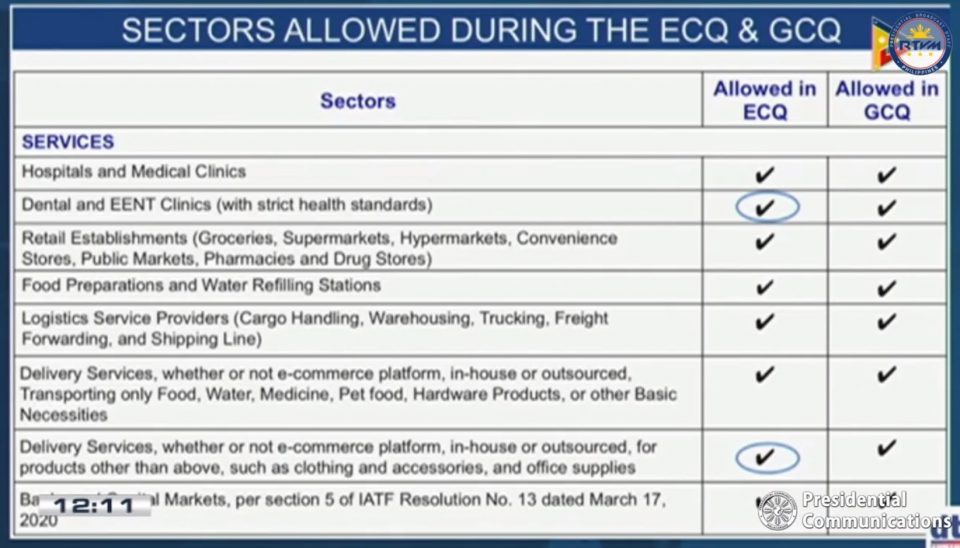
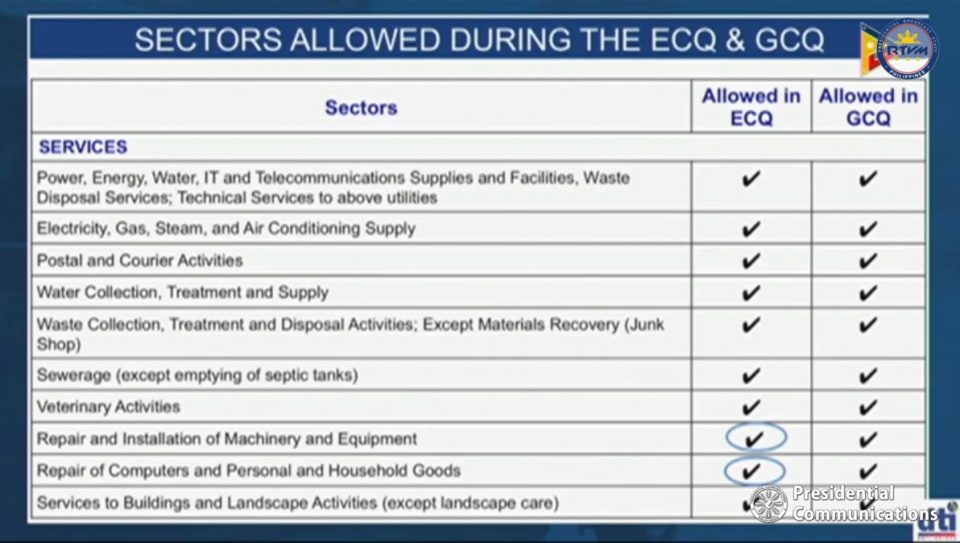
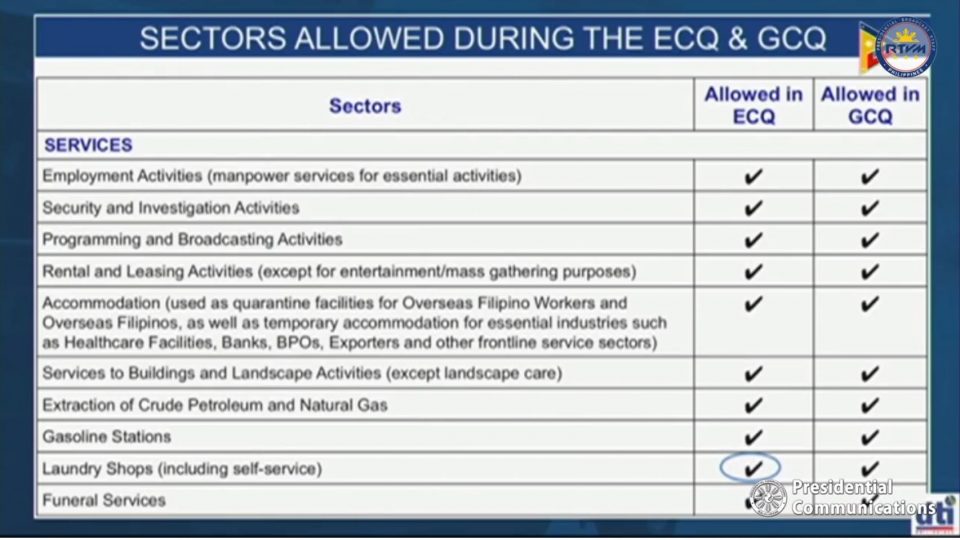
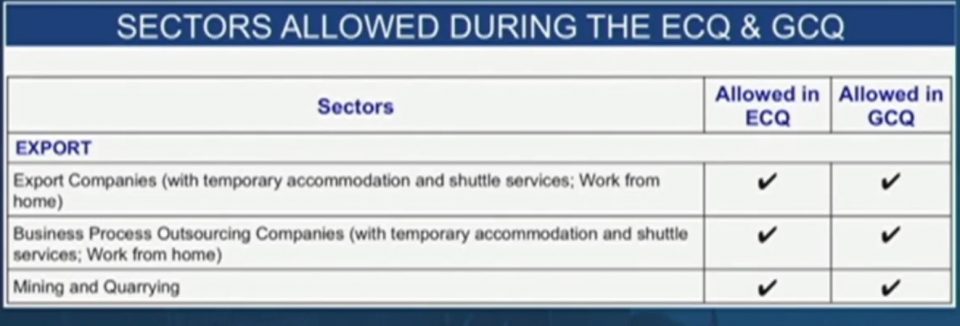
-List of businesses allowed only for GCQ areas (banned for ECQ)
Roque also identified the businesses and services allowed under GCQ, but not for ECQ areas. These are the following:
-other manufacturing activities, such as beverages, both non-alcoholic and alcoholic drinks, cement and steel, electrical machinery, wood products, furniture, non-metallic products, textiles, wearing apparels, tobacco products, paper and paper products, rubber and plastic products, coke and refined petroleum products, other non-metallic mineral products, computer, electronics and optical products, electrical equipment, machinery and equipment, motor vehicles, trailers and semi-trailers, other transport equipment.
-other services such as malls and commercial centers but only with a limited opening, and only for hardware stores, clothing, accessories and non-leisure stores
-wholesale and retail trade and repair of motor vehicles and motorcycles, construction and Build, Build, Build, forestry and logging, publishing activities, motion picture, video and television program production, sound recording and music publishing activities.
“Ibig sabihin iyong mga telenovela, dapat i-tape sa GCQ areas, hindi pa po pupuwede sa Metro Manila,” Roque said.
-Advertising and market research, real estate activities except real estate buying and selling, other administrative office support and other business activities; legal and accounting
– Insurance, reinsurance and tension funding except compulsory social security, architecture and engineering activities, technical testing and analysis, scientific and research development, other professional, scientific and technical activities, social work activities without accommodation and government office and frontline offices.
“Ang lahat ng opisina po ng gobyerno, pupuwede nang magbukas under GCQ,” Roque said.
As to salon, spas and other personal care, such as parlors and barber shops, the Department of Trade and Industry has recommended its opening provided there would be strict health standards, but Roque said that he does not know if this recommendation would be charged later, on Wednesday, April 29.
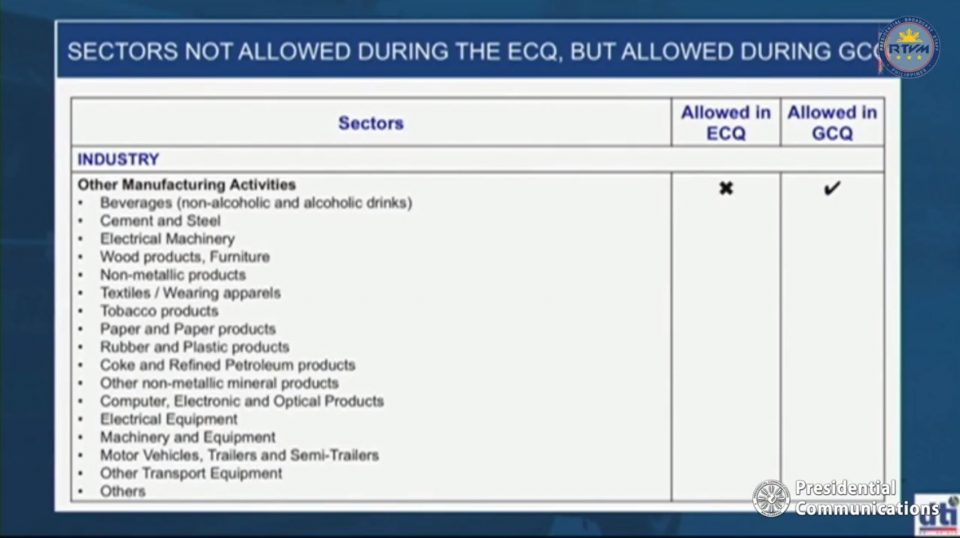
Courtesy PCOO


-Businesses activities barred under GCQ, ECQ-
Meanwhile, these businesses and activities are still not allowed even for GCQ areas. These are the following:
– entertainment related mass gatherings, not limited to theaters, cinemas, large concerts, festivals, carnivals, conventions, shows, clubs and pubs
-gyms, fitness studios and sports facilities
-business related mass gatherings including but not limited to trade shows, conferences, conventions, workshop and retreats, and politically-related mass gatherings including but not limited to election rallies, polling centers, parades, speeches and addresses.
– sports related mass gatherings including but not limited to trainings, games, tournament, and championship
-libraries, archives, museums and other cultural activities
-gambling and betting activities
-travel agency, travel operator, reservation services and related activities
– activities related to membership organization
Although not in the list, he read, Roque said religious gatherings are still banned in GCQ areas.
Two days later, on Thursday, April 30, he said that religious gatherings will be allowed provided that there will be strict social distancing of at least two meters during such events.


“Ngayon po, ung mga essential work gatherings and religious activies, pupwede na pong magpatuloy provided mayroong social distancing na at least two meters (Now, essential work gatherings and religious activities may continue, provided there is social distancing of at least two meters),” Roque said in a press briefing held at Malacanang on Thursday, April 30.
He emphasized that wearing of face masks, face shields and facial protective equipment, as well as observance of other minimum health requirements, will be mandatory in these gatherings.
For his part, Interior Government Secretary Eduardo Año said that implementation of the social distancing and minimum health requirements will be up to the leaders of religious groups.

A day later, however, on May 1, Roque said that this would be referred back to the table of IATF for further study following concerns that local government units would not be able to monitor the strict compliance in religious establishments of the strict physical distancing protocols inside places of worship.
He said that this revision would be put on hold pending further study by the IATF.
Eagle News Service (Updated May 1, 2020)








